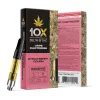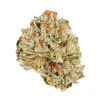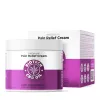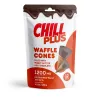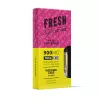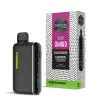CBD and THC are two of the most famous substances found in cannabis, and most people are already aware of the difference between them. However, hemp has a lot more to offer than just this famous couple. There are dozens of compounds in cannabis that can make your life better in ways you never imagined. From HHC to delta 9, cannabis has something for everyone!
A key player in weed's ability to get you high is THCA, a non-psychoactive substance that's usually overlooked. But what exactly is THCA? With a name so similar to THC, are the two compounds anything alike? You've come to the right place if you've been eager to learn more about THCA! There is a lot to discuss.
What is THCA?
Tetrahydrocannabinol acid, or THCA, is a non-psychoactive cannabinoid found in raw and unheated cannabis plants. The acidic form of THC, THCA, does not produce a high. The chemical structures of both cannabinoids are similar, but their functions are different.
THCA is derived from CBGA, also known as the "mother of all cannabinoids." CBGA is produced by the cannabis plant as it matures. Because THCA has an extra molecular carboxyl ring, it cannot bind to the brain's receptors to produce the euphoric high associated with THC.
Although you can't get high directly from THCA, the compound still has many positive benefits that impact your experience with marijuana. And of course, THCA is best known for being converted into THC with heat exposure. In other words, THCA isn't psychoactive, but it allows for the creation of THC, which is marijuana's main psychoactive compound.
WHAT IS THCA? Cannabinoid Profile THCA
THC vs. THCA
As we know, THCA transforms into THC when heated. This happens through a process known as decarboxylation, which involves altering THCA's molecular structure to lose that extra carboxyl ring. Whether you've ever made edibles, you already know that "decarbing" marijuana is the most essential part of making edibles, and this THC conversion is why. In this heating process, THCA is converted into THC, making your final product psychoactive instead of non-psychoactive.
But does every tetrahydrocannabinol stem from THCA?
Delta 8 vs THCA
Since delta 8 is a tetrahydrocannabinol, it is also derived from THCA. Despite the fact that delta 8 THC is naturally present in hemp plants, it is only found in trace amounts. Due to this, scientists have developed a method for creating delta 8 using hemp-derived CBD in a lab setting by using a process called isomerization. As all cannabinoids are composed of the same molecular make-up, rearranging existing atoms in CBD is enough to create delta 8.
It is important to understand that THCA is non-psychoactive, whereas delta 8 has a mild psychoactive effect. To summarize, delta 8 would be a good choice if you're looking for a gentle and relaxing high, while THCA would be a better choice if you're looking to avoid any psychoactive effects while still receiving the benefits of marijuana.
Delta 9 vs THCA
The main psychoactive compound in cannabis plants is delta 9, which is commonly known as delta 9 THC. The compound THCA can be converted into delta 9 via heat, but other than that, they are distinct.
THCA is the non-psychotropic, inactive cannabinoid found in raw cannabis, while THC is its active, psychotropic component that results from a little heat. Scientifically speaking, THCA has an additional carboxyl group that prevents it from binding to CB1 receptors, thus making it non-psychoactive. Decarboxylation, however, removes that carboxyl group, leaving delta 9, which is undoubtedly psychoactive.
Delta 10 vs THCA
Delta 10 is another mildly psychoactive tetrahydrocannabinol that can be derived from THCA. While the compound is milder than delta 8, it has a more energizing and stimulating effect. The main difference between delta 10 and THCA is that delta 10 is psychoactive, while THCA is not. Delta 10 will make you more creative, focused, and energized, as well as give you a very manageable and understated high. THCA, on the other hand, has no psychoactive effects.
Does THCA Get You High?
Due to its non-psychoactive nature, THCA will not make you high when consumed. A study on THCA's affinity and efficacy for cannabinoid receptors found that the compound does not bind to CB1 receptors or any other major cannabinoid receptors.
Heat and decarboxylation are required to convert THCA into THC, which is what makes cannabis psychoactive. The non-psychoactive nature of THCA explains why raw cannabis cannot cause a high when eaten or ingested.
In conclusion, THCA does not cause a high if it has not been decarboxylated.
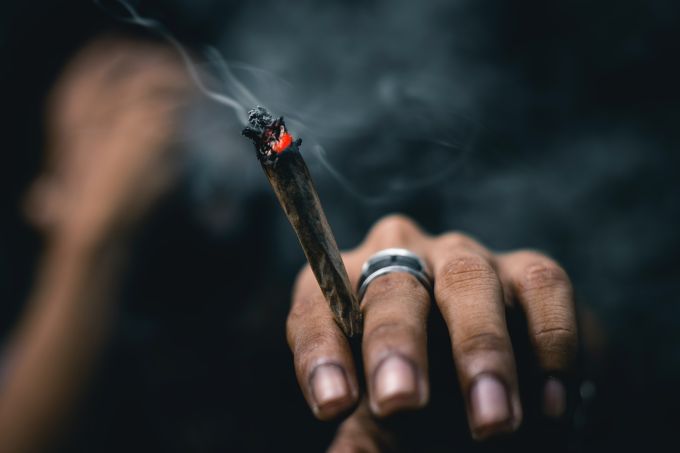
The Effects & Benefits of THCA
It has already been mentioned that THCA does not bind to cannabinoid receptors in our bodies, which is why it does not make us high. But what else is there to know about this intriguing and enticing cannabinoid?
Research published in the British Journal of Pharmacology in 2013 examined non-THC cannabinoids' effects on prostate cancer growth. THCA, among other compounds like CBD, CBG, and CBDA, was “assessed against a number of tumor cell lines distinct in origin and typology.” According to the study, these compounds “were usually the more effective inhibitors of cancer cell growth, with little or no activity on non-cancer cells.”
Another study, also published in the British Journal of Pharmacology that same year, looked at THCA’s anti-emetic effects, finding that THCA “may be a more potent alternative to THC in the treatment of nausea and vomiting.”
THCA has also been shown to be an effective neuroprotectant in other studies. Its potential protective effects are associated with the activation of the PPARγ receptor. The compound may be effective in preventing the progression of neurodegenerative diseases such as multiple sclerosis, Parkinson's disease, and Alzheimer's disease. In preclinical studies, THCA reduced inflammation and pain by inhibiting the production of inflammatory markers and regulating inflammation pathways.
According to a study published in the National Library of Medicine in 2020, THCA inhibits metabolic disease caused by diet-induced obesity. It was demonstrated that THCA could reduce obesity and associated diseases like diabetes and fatty liver disease.
There is some promising research on THCA, but we have a long way to go before we fully understand its benefits. THCA, however, has many potential benefits that we know of, including:
- Anti-cancer
- Anti-nausea
- Neuroprotective
- Anti-inflammatory
- Anti-obesity
To date, no side effects have been observed with THCA consumption. There is speculation that THCA may turn into THC in the digestive tract and cause psychoactive effects. However, even if that is true, the amount of THC produced, and the subsequent effects, will probably be negligible.
How Long Does THCA Stay in Your System?
A little tricky to determine how long THCA stays in your system. When ingested after decarboxylation, THCA enters the body as THC. THC can be detected in hair for up to 90 days, in urine for up to a month, in saliva for up to 24 hours, and in blood for up to 12 hours.
While it is unclear how long THCA stays in your system when consumed raw, some research suggests that it may still trigger a positive drug test due to the way cannabinoids are metabolized.
Does THCA Show Up on a Drug Test?
In spite of THCA's non-psychoactive nature, it may still result in a positive drug test. The most common method of cannabis drug testing is urine screening, which can be done in one of two ways. The first test is the immunoassay (IA), which is a quick way to test for macromolecules in a sample. Although IA tests are cheaper and faster, they often produce inaccurate results. In the second method, Gas Chromatography-Mass Spectrometry, the sample is vaporized and separated into various components before being fragmented for more accurate results.
Currently, drug tests aren't able to distinguish one cannabinoid from another since all tetrahydrocannabinols end up as THC-COOH, a metabolite that drug tests actively seek out. “Tetrahydrocannabinol-carboxylic acid (THCA) is the analyte tested in urine for marijuana,” says Ronald Flegel from the Substance Abuse and Mental Health Services Administration. THCA is not psychoactive, but it may still trigger a positive test result.
According to a study published in 2015, the presence of cannabinoids in hair does not indicate cannabis consumption. THCA was administered to participants daily for one month at a dose of 50 milligrams. While no THC was found in the hair specimens, THC-COOH was present.
Although THCA is non-psychoactive and technically legal (more on that later), it still has the potential to trigger a positive result on a drug test despite it lacking thermal conversion to THC. If you know you will be taking a drug test soon, stay away from any cannabis compound for a few weeks beforehand. You could probably try explaining the difference between THC and THCA to your drug tester, but at the end of the day, it's better to be safe than sorry.
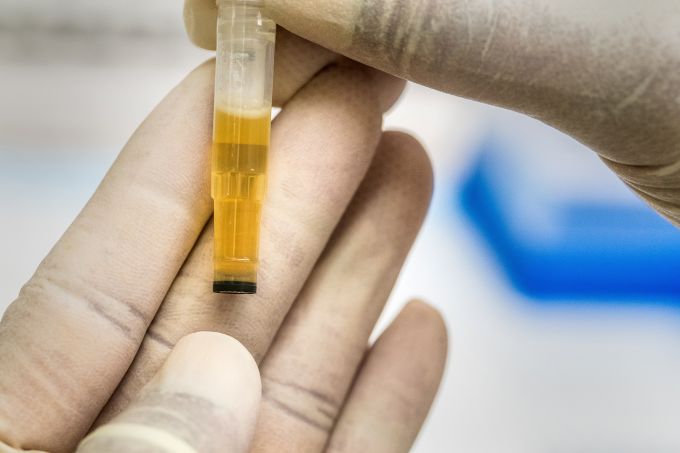
Can You Build Up A THCA Tolerance?
There has been no research to suggest that users can build up a tolerance to the anti-inflammatory, antiemetic, or neuroprotective effects of THCA. In spite of that, you can build a tolerance to THC, which is produced by decarboxylation of THCA.
After using cannabis for an extended period of time, many users develop a tolerance for THC. You may also find that you are less likely to enjoy using THC products as a result. You may feel that a certain amount of cannabis does not produce the psychoactive effects it once did, or you may feel dissatisfied with the number of baggies you go through in a given period of time.
When this happens, you need a tolerance break, or a "T" break. You may be able to decrease your tolerance over time by not using cannabis as frequently. Take a break for a couple days or a couple weeks, it's up to you, but the longer you wait, the lower your tolerance will be.
Since THCA has no psychoactive effects to begin with, adding it to your daily routine probably won't diminish its effects over time. Even so, the fact that no research has proven you can build a tolerance for THCA doesn't mean it's impossible. Take a break from THCA for a couple days if you don't feel like it hits the way it used to.
Is It Safe to Consume THCA?
It is generally agreed that THCA is relatively safe and has no potential for addiction because it is non-psychoactive. However, going overboard with any natural compound can result in an unpleasant experience and a range of side effects, including dizziness, restlessness, and diarrhea, so be careful not to take it to excess. A number of user reports also indicate that THCA may cause anxiety if taken at higher doses, so even though the compound will not get you high, it's still wise to exercise restraint when using the cannabinoid.
Furthermore, the most significant safety factor when it comes to cannabinoids is getting them from a trustworthy and reputable source. It is possible to find THCA flower, pre-rolls, tinctures, edibles, capsules, topicals, and more in some stores, but first, you need to determine which company you can trust to deliver the safest and highest-quality product. The compound is safe as long as it is sourced from organic plant material and tested for contaminants or impurities.
Dosing THCA
As a cannabinoid with many potentially beneficial effects, THCA is certainly worth exploring. In some studies, THCA has shown significant health benefits at lower doses than other cannabinoids, which means that consumers can use less product while still getting more relief. THCA dosage should be 10 to 100 times lower than THC dosage, according to some sources. In preclinical studies, full spectrum extracts of THCA are shown to be 10 times more potent than isolates.
Research on THCA and how to dose it remains in its infancy, so we do not yet have exact guidelines for how much to take.
THCA should be taken according to the same rule of thumb as other cannabinoids: start low and build up to a dosage that feels comfortable for you. A THCA product will likely come with instructions on how to use it. Make sure you follow the dosage recommendations on your product packages, or even better, start a little lower than the recommended amount.
It's important to remember that dosing cannabinoids isn't an exact science since it depends on a lot of factors, such as weight, age, metabolism, and tolerance, so only you can determine what's right for you.
THCA: Smoking, Dabs, or Gummies?
The hemp market offers a wide variety of products containing THCA. But the decision isn't just about whether you prefer vaping, eating, or dropping THCA. In contrast to other compounds, THCA behaves very differently depending on how you take it; your choice of product can make the difference between a psychoactive and non-psychoactive experience.
If you heat THCA, whether it's in the form of smoking, dabbing, or cooking, it will become THC, a psychoactive substance that will make you high. Although you can smoke, dab, or eat THCA, each of these methods will result in you ingesting THC, not THCA. In case you'd like a powerful stone, go ahead and heat it up, but if you're purely interested in THCA for its non-psychoactive properties, here are some heatless (and therefore buzz-less) methods to consume it:
- Juicing: Raw cannabis leaves can simply be juiced or blended into a drink or smoothie, just like fruits and vegetables. By using this method, you can extract the maximum amount of THCA. It is also possible to freeze large batches of the recipe, so you can defrost chunks when you need them.
- Tinctures: THCA is highly present in raw cannabis tinctures. In addition to requiring less work, these tinctures are also easier to dose accurately than juicing.
- Transdermal Patches: Transdermal THCA patches adhere to any veinous part of the skin and stay on for 8 to 12 hours. You can benefit from THCA for a prolonged amount of time in this convenient, hassle-free manner.
- Pre-Made Edibles: There are currently pre-made THCA edibles available on the market, but we recommend doing your research, buying from a trusted brand, and verifying that each product has been tested by a third party. As cannabis is normally decarboxylated when added to edibles, you need to ensure that THCA edibles are not heated even in the slightest, or you may be exposed to THC.
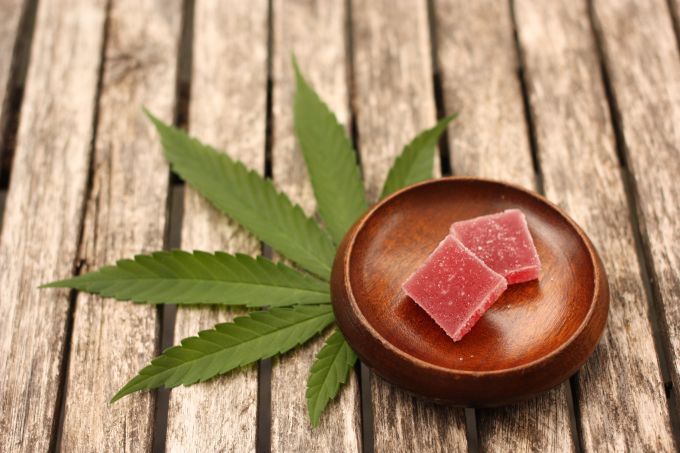
Is THCA Legal?
In terms of legality, THCA is quite complicated. Federally, the compound has not been classified as a controlled substance. Possession of THCA could get you into legal trouble, however, if you attempt to decarb raw cannabis. As soon as THCA is decarbed, it becomes THC, the psychoactive compound in cannabis that remains illegal at the federal level. Additionally, the DEA could consider THCA an analog of THC and press charges under the Federal Analog Act.
The Farm Bill is another important legal document that influences THCA's legality. The Farm Bill, or Agriculture Improvement Act as it is also known, distinguishes legal hemp from illegal marijuana based on the delta 9 content of each plant. Cannabis containing 0.3% THC or less is classified as hemp, while cannabis containing more than 0.3% THC is classified as marijuana.
Under the Farm Bill, a bud with 20% THCA and only 0.2% THC qualifies as hemp and is therefore legal under federal law as well. Despite the federal government's ruling, some states have taken steps to restrict or ban hemp-derived cannabinoids. There are also some states that have passed their own medical and recreational cannabis laws that differ from the federal government's. Thus, to summarize, it is important to understand that legality becomes more complicated at the state level.
While THCA flower is completely legal in some states, such as North Carolina, which does not currently use a "total THC" standard for hemp in any of its regulations, it is restricted in other states, such as Oregon. In states like Pennsylvania, where permitted hemp processors may only use cannabis material that passes a total THC test, determining whether THCA is legal or not can be a little tricky, because retailers of finished hemp products do not need hemp permits, and therefore the total THC requirement does not apply in their case.
While THCA appears to be legal when it comes from hemp containing less than 0.3% THC, and dubiously legal when it comes from marijuana, determining its status under state law is much more complicated than understanding its blanket legality under federal law. This can lead to confusion and misunderstanding of hemp laws at a state level, which is why it is important that you research your state's hemp laws on your own to understand where your state stands on this compound.
Final Thoughts on THCA
So, what is THCA? Although it is commonly known as the precursor to THC, the compound itself has a lot more to offer than the possibility of being psychoactive. In some studies, THCA has shown promise in many scientific fields, such as anti-inflammation, neuroprotection, and obesity prevention.
When taking THCA, it's important to understand that any form of heating will effectively convert the compound into THC, which will make you high despite its non-psychoactive nature. If you want to convert THCA into THC in order to create a psychoactive compound, feel free to use heat. If you want the non-psychoactive effects of the compound, keep it away from heat sources (including the sun).
So, there you go! A complete, comprehensive explanation of THCA's wonderful and sometimes confusing nature. Now that you have this information at your fingertips, we hope you will be able to make informed decisions about your cannabinoid products going forward.

